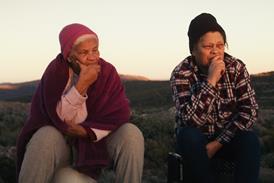At its exact midway point, with only five more days to go, the 54th edition of the Cannes Film Festival registers as a solid but not particularly exciting programme. No major discoveries, no artistic breakouts, not many commercial hits -- not even real controversies or scandals to stir festival watchers into heated debates and galvanise what has been a low-key event so far.
With half of the competition movies screened, the only prevailing consensus is over which are the weakest entries in the main line-up. Critics agree that neither Pau And His Brothers, Spaniard Marc Reca's simplistic pastoral fable of the impact of death on one family, nor Catherine Corsini's Replay (La Repetition), the only solely femme-directed movie and yet another French treatment of female friendship, are likely to snatch awards next weekend.
There's also agreement that the most enjoyable -- and possibly best-reviewed -- movie thus far is DreamWorks' enchanting animation Shrek, which seems to please both high-brow and middle-brow viewers alike, and is on a global course to become one of the studio's most triumphant box office grossers.
Opening night selection, Moulin Rouge, Baz Luhrmann's post-modern, intentionally anachronistic take on the decadent club at the turn of the century Paris, received mostly positive reviews, with a small but vocal minority claiming that the movie represents a sensory overkill, relying too much on artifice, expressionistic methods and endless montages. Festival programmers were reportedly relieved that Moulin Rouge, which received an enthusiastic standing ovation at its world premiere, never created the stir it was expected to.
Moulin Rouge demonstrates this year the eternal conflict between style and content, or movies that are superbly mounted but have little to say, and movies that tackle relevant social issues, but lack the stylistic treatment to do it more effectively. Hence the Coen brothers' latest foray into noir, The Man Who Wasn't There, is considered to be a brilliantly executed, visually striking black-and-white movie that leaves a lot to be desired in narrative, tone, and mode of engaging viewers.
Veteran Croisette directors, who have made better and more interesting films before, include Michael Haneke, whose The Piano Lesson, with Isabelle Huppert, was charged with being a simplistic and excessive psycho-sexual study of masochism. Japanese director Hirokazu Kore-eda, who three years ago fascinated with After Life, is back with the thin, pretentious, over-long Distance, a look at four relatives trying to come to terms with the death of their loved ones, all members of a terrorist religious cult.
Two competition films have awed critics with their bold political views. While there are no surprises in Danis Tanovic's No Man's Land, a black comedy about the Bosnian conflict, it still manages to put across the absurdity of the situation, aiming its targets not only at the fighting factions but also at the ineffectual U.N. and eternally hungry and preposterous media.
Far more ambitious, if not entirely successful, was Iranian filmmaker Mohsen Makhmalbaf's fiction-documentary Kandahar, the first film to deal with starvation and death in today's Afghanistan, based on research in refugee camps near the border. Some critics perceived the English-speaking film, which centres on the efforts of an Afghan journalist now living in Canada to find her sister and prevent her suicide, as Makhmalbaf's attempt to have a wider commercial appeal in the West.
One of the more alarming trends in Cannes this year is the disappointing quality of most American independent movies, which are spread in the various series. The two indies shown in Directors' Fortnight, Ethan Hawke's Chelsea Walls and Arliss Howard's Big Bad Love, both representing feature debuts by actors directing their wives (Uma Thurman in the former, Debra Winger in the latter), have frustrated critics for different reasons. Hawke's film was dismissed as a slight narrative that failed to take advantage of its intriguing milieu, New York's notorious Chelsea hotel, whereas the more ambitious and consequential Big Bad Love was reprimanded for being messy and rambling in its evocation of a writer's struggle to come to terms with his muse and demons.
Also failing to sway was Todd Solondz's new picture, Storytelling, which had the misfortune to be a follow-up to his most challenging and accomplished film to date, the Cannes-premiered Happiness.
Also representing the American side was the Coppola clan, with Coppola pere impressing with his expansive and definitive rendition of Apocalypse Now Redux, his monumental war-horror epic, which grabbed the 1979 Palme d'Or. Twenty-two years after it was made, this masterpiece continues to overwhelm as one of the highlights of the new American cinema -- and, sadly, Coppola's last truly great picture. In contrast, CQ, made by Coppola fils, Roman, was unanimously rejected by critics as a minor, self-indulgent effort.
It's a slap on the face of those who claim that filmmaking has increasingly become a young man's game that one of the best competition films this year is I'm Going Home (Vou Para Casa), Manuel Oliveira's personal and elegiac meditation on an aging, highly moral actor, superbly played by Michel Piccoli (a front-runner for the acting prize), who realizes he's out of tune with his times. At 92, the Portuguese master proves that he is not only the oldest practicing filmmaker in the world, but also one who's still full of surprise -- I'm Going Home is his strongest features in a decade.
Hopefully, critics' lukewarm response to the main line-up will change in the next couple of days, when some of the world's greatest auteurs, Jean-Luc Godard, Hou Hsiao Hsien, Olmi, and Shohei Imamura, will unspool their new works later in the festival..



















No comments yet